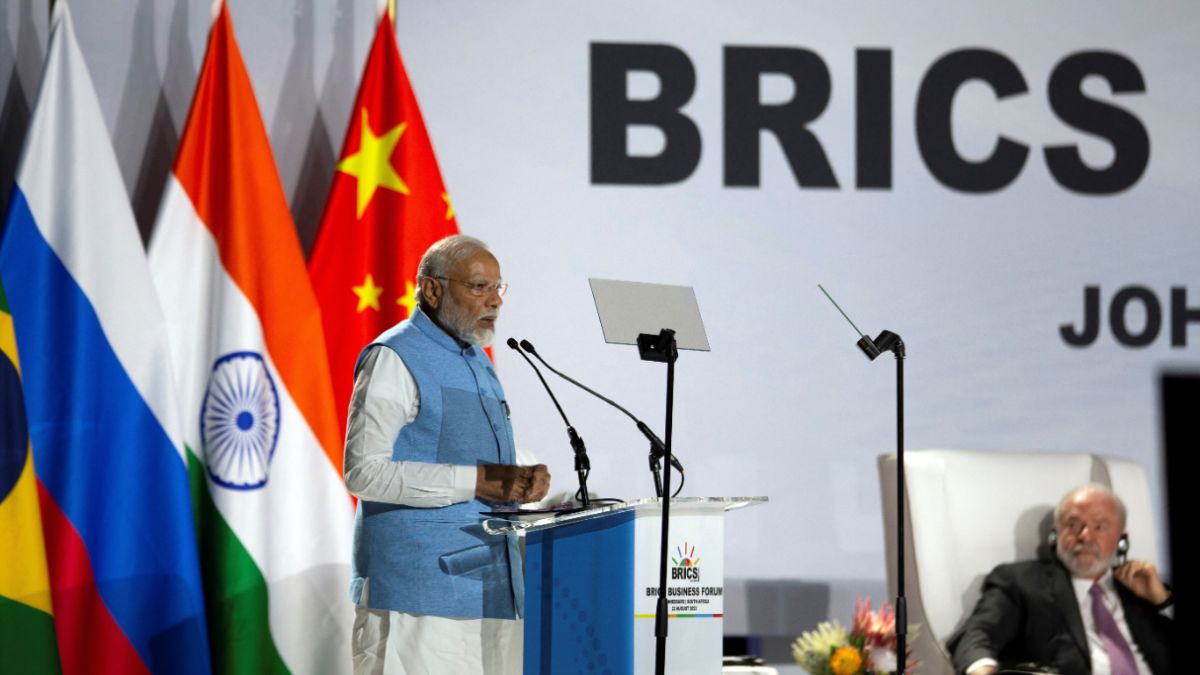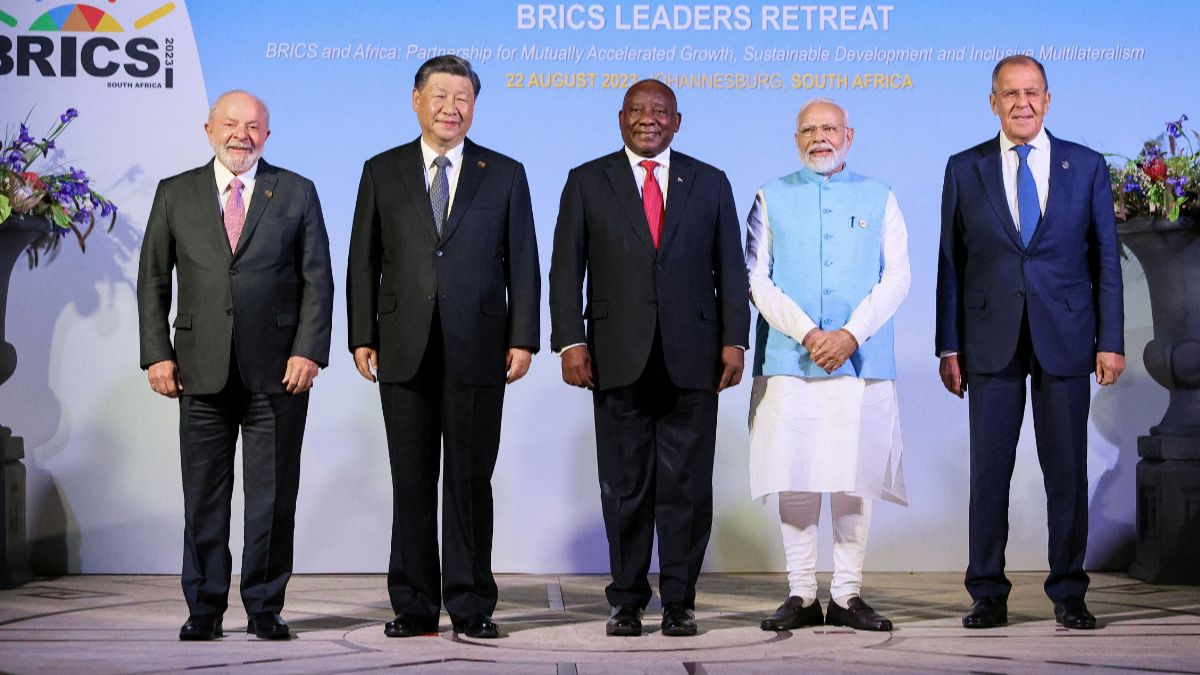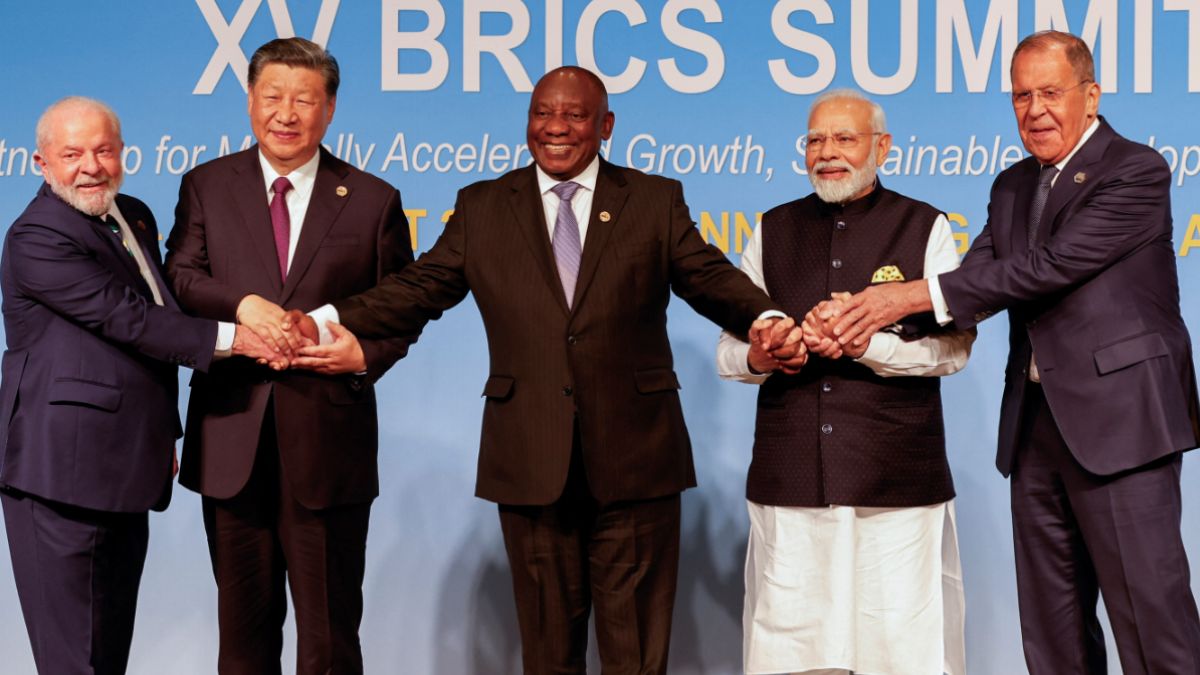- By Sukanya Saha
- Mon, 04 Sep 2023 04:00 PM (IST)
- Source:JND
In a bid to increase their political and economic sway within a global framework that is predominantly shaped by the western nations, the BRICS (Brazil, Russia, India, China, South Africa) group of emerging nations made a decision on August 24, 2023 to broaden their membership by extending invitations to six additional countries. Starting in the upcoming year, Iran, Saudi Arabia, Egypt, Argentina, the United Arab Emirates, and Ethiopia will become part of the existing group of five members. This announcement was made during a summit held in Johannesburg last month.
Characterising the expansion as a "historic" development, China's President Xi Jinping championed the inclusion of new members, portraying an expanded BRICS as a means for the countries of the global south to exert a more influential role in international affairs.
Nonetheless, it remained uncertain how the expansion would substantially augment the group's influence on the worldwide platform. This outcome hinges on their ability to act collectively. In an exclusive interview with Jagran English, Nandan Unnikrishnan, Distinguished Fellow at the global think tank Observer Research Foundation, New Delhi, overseeing the Eurasia Programme of Studies, emphasised that if all these nations can coordinate effectively, they can undoubtedly emerge as a "significant global economic force."

(Image credit: Reuters)
Speaking on how the recent expansion of the grouping could influence the dynamic of global economic cooperation and geopolitical balance, he said, "With the inclusion of these six countries Saudi Arabia, UAE, Egypt, and others, the combined GDP of the BRICS, once they join on January 1, will be rival to the combined GDP of the G7. In fact, it will be a little bit more. And in terms of population, the 11 BRICS countries will have many more people than the G7 countries. So, in that sense, they are already a force. When you include all major energy producers such as Russia, Saudi Arabia, and the UAE, to BRICS, the combination of all these countries will emerge as a potent economic force on the planet if they collaborate effectively."
How Will BRICS Expansion Benefit India?
The establishment of BRICS in 2009 was founded on the concept that the four emerging markets of Brazil, Russia, India, and China would emerge as the future dominant economic forces globally, with the addition of South Africa occurring one year later.
BRICS is motivated by two fundamental factors: Firstly, there exists a significant global sentiment against the US, and these nations seek a coalition where they can leverage this sentiment to unite. Secondly, there is a strong desire for multipolarity, a platform where countries from the Global South can demonstrate their unity and solidarity.
Explaining how India could gain advantages from its participation in the BRICS alliance, Krishnan said, "If we revisit the origins of BRICS, initially it was just BRIC before South Africa's inclusion. Four countries came together because they felt that the world had significantly changed in the 21st century as compared to the establishment of the world order, including Bretton Woods institutions, back in 1945, all this was set up. They believed that these changes needed to be reflected in the global governance.
"In other words, these countries felt that they needed to be amongst those who make the rules and not just rule-followers. This perspective has not changed. So, we still need to have our voices heard and India's voice has been significantly strengthened by its association with BRICS. Now with the BRICS expansion, India's influence will be further amplified and all the countries joining BRICS have strong friendly relations with India."
BRICS Expansion Will Strengthen Diplomatic Ties:
Numerous developing nations sought to become part of the BRICS group, but India was cautious about the potential changes in the dynamics of an expanded bloc. India even signalled its intention to prioritise its "Strategic Partners" in this context.
"India took the lead in forging a consensus on membership criteria and the selection of new members," an Indian official said after the BRICS Summit 2023 concluded. India's efforts were "guided by our objective to incorporate our Strategic Partners as new members," added the official.
India maintains a 'strategic partnership' with the UAE and Argentina. Yet, there remains uncertainty about whether the term 'Strategic Partners,' as employed by the Indian official, relates to the official status of the bilateral relationship or serves as an assessment of the country's importance to India.

(Image credit: Reuters)
Speaking on the potential challenges that could arise for India in terms of fostering economic growth and strengthening diplomatic ties, he said that BRICS is not a closed group isolated from the rest of the world, and should not be perceived as anti-Western. These countries recognise that they have developmental challenges that may require Western cooperation. Balancing their interests and concerns while maintaining good relations with the West is a significant challenge. Another challenge lies in managing internal divisions, such as India-China tensions, Ethiopia and Egypt's dispute over water and more.
However, he also highlighted that despite these challenges, BRICS offers immense opportunities for inclusive multilateralism compared to Western-exclusive clubs like the G7.
India's Strategies For Reaping BRICS Expansion Benefits:
India has experienced significant economic benefits through its participation in BRICS over the years. Collaborative efforts within BRICS have opened doors to emerging markets, boosting India's exports and foreign investment. Additionally, growing relations with the US have brought technology transfers, investment, and expanded trade opportunities, bolstering India's economic growth. These ties have helped diversify India's economic partnerships and strengthen its position on the global stage.
Describing potential strategies for India to maximise the positive impacts of the expanded group on its own development and the global economy's stability, Krishnan said, "India's greatest challenge today is economic development and inclusive economic development. So, the Indian foreign policy should be geared towards meeting this goal. And given the kind of economic heft that the BRICS has, if you also look at India's growing relationship with the West, I think India is in a very good place in terms of its ability to leverage its diplomatic strengths to help its development."

